Asthma is an inflammatory disease that affects the lungs. It’s a chronic condition and affects the air passages in the lungs, resulting in narrowing, tightening and inflammation of the muscles surrounding the small airways. This causes symptoms such as chest tightness, wheeze, shortness of breath, and cough. Some triggers can worsen the symptoms, including the foods we eat. However, eating the following fresh and nutritious foods may improve breathing health:
1. Vitamin D rich foods
Consuming adequate vitamin D may reduce the number of asthma attacks in children ages 6 to 15. Significant sources of vitamin D include; eggs, salmon, fortified orange juice, and fortified milk and milk.
2. Magnesium rich foods
Children between the ages of 11 to 19 who have low magnesium levels may also have low lung flow and volume. Eating foods such as salmon, dark chocolate, spinach, pumpkin seeds, and Swiss chard can improve magnesium levels. Inhaling magnesium through a nebulizer is a good way to treat the condition.
3. Foods high in vitamin A
Patients with asthma often have lower levels of vitamin A in their blood. High levels of vitamin A correspond to better lung function. The best sources of vitamin A are carrots, sweet potatoes, cantaloupe, broccoli, spinach, kales, and romaine lettuce.
4. Turmeric
East-Asian and Chinese cultures have long used turmeric to treat respiratory disorders. This spice contains curcumin, which may help reduce inflammation in the airways.
5. Beans
High-fiber foods such as beans and legumes promote the growth of healthy gut bacteria. These bacteria lower the risks of inflammatory disorders. Luckily beans and legumes are extremely versatile ingredients to add to soups, chilis, sauces, and more. Plus, there are so many to try—including kidney, black, and navy beans as well as chickpeas, lentils, and so many more!
6. Bananas
Studies show that bananas may decrease wheezing in patients suffering from chronic asthma. This is due to bananas’ potassium and antioxidant content, which may improve lung function.
While there’s no concrete evidence that a specific diet affects the severity or frequency of asthma attacks; eating a healthy diet may help you manage the symptoms of asthma, and certain dietary changes may lessen the severity of symptoms. No diet or food should substitute treatment or other treatment prescribed by doctors. Changes in diet alone cannot reverse or cure the disease. However, talk to your doctor today about how the foods you eat may help benefit your asthma symptoms.


